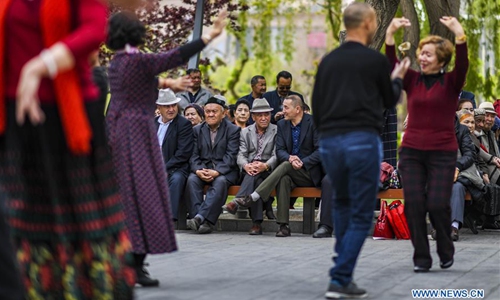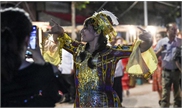Dirty public opinion war won't deter China's governance in Xinjiang
Social media lies about China’s Xinjiang

People dance at the People's Square in Korla, Northwest China's Xinjiang Uyghur Autonomous Region, April 10, 2019. Photo: Xinhua
After Turkish-German soccer star Mesut Özil took to Twitter to criticize the governance of China's Xinjiang Uyghur Autonomous Region, some other sports and cultural celebrities have followed suit, putting pressure on Xinjiang through social media.Some others used social media to post "missing person" posts to question Chinese authorities' claim that all trainees at the vocational education and training centers have graduated. Most of those posts are cheap spam.
Both incidents are clearly being planned and pushed by some anti-China forces. In the first case, some sports and cultural celebrities are mobilized; although most of them believe in Islam, some of them live in the West and are deeply influenced by Western public opinion. And they choose Western social media to send political message, which is worth noting itself. Strictly speaking, these posts are more echoes of Western opinion, rather than attitude of the Islamic world.
When commenting on Özil's post, a spokesperson of the Chinese Ministry of Foreign Affairs said that he is welcome to visit China's Xinjiang.
Western public opinion has overwhelmingly slandered and labeled Xinjiang's governance, but a handful of celebrities following suit on Western social media have never been to Xinjiang. They just blindly followed what Western media described. They should be encouraged to visit Xinjiang to see if it is true that mosques have been destroyed and Muslim women have been forced to marry Han people.
Seeing is believing. Özil and others should take responsibility for their remarks on Xinjiang. They should come to Xinjiang to see if the Muslim community has smooth communication network, and compared with chaotic ethnic regions of other countries, if Muslims in Xinjiang have better life or not.
Those Xinjiang-related posts, in general, are a wave of organized or coordinated pranks. First, according to authorities in Xinjiang, more than half of those missing person posts are vague and they don't know who the proclaimed missing person is and the individual cannot be found in Xinjiang. Some are indeed trainees who have graduated from the vocational education and training centers. Some others are not trainees but criminals who have already been sentenced for crimes they committed, and quite a few of them have been listed in the previous "missing people" posts abroad. Xinjiang has long publicized their crimes, but this time these cases have been hyped again.
As we all know, social media is often not the place to be reasonable. It is more suitable for slogans, troubles and demonstration of public opinion. The organizers of those missing person's posts are catering to Western public opinion and creating a new wave of public opinion to smear Xinjiang. The truth doesn't matter to them at all.
There have been many violent and terrorist incidents in Xinjiang in the past, and of course some criminals need to be brought to justice. There is a clear line between criminal prosecution and the work of vocational education and training centers whose mission is to de-radicalize. Some of the dark forces outside the country have deliberately mixed them, questioning a legitimate campaign.
These are not new to people who understand the internet. Those posts are not the pursuit of justice, but a dirty war of public opinion.
In the end, what happened in Xinjiang is not a debate about values, but a movement to restore peace and prosperity, a movement to defend and save the lives of countless people. Human rights in the slogan cannot replace the rights that more than 20 million people of all ethnic groups in Xinjiang cannot live without every day. Misunderstandings will eventually melt, lies will be deflated or laid bare with facts.



